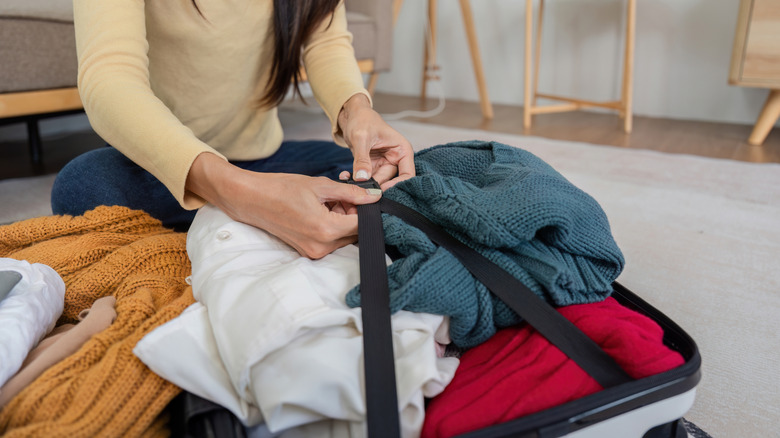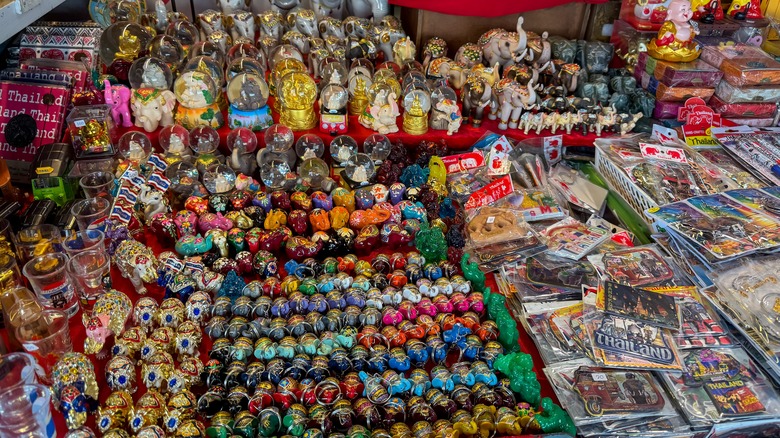BAGSMART Large Toiletry Bag Travel Bag with Hanging Hook, Water-resistant Makeup Cosmetic Bag Travel Organizer for Accessories, Shampoo, Full Sized Container, Toiletries
$22.99 (as of April 14, 2025 07:48 GMT +00:00 - More info)Have you ever checked into a hotel, ready to unwind after a long day of travel or sightseeing, only to find out you’ve been scammed? It’s a disheartening experience that can turn your dream vacation into a nightmare. Scams are an unfortunate part of traveling that even experienced tourists need to be mindful of. Believe it or not, these scams can happen right under the roof of your accommodation.

Shop These Accessories for a Comfortable Trip
The Experts Weigh In: Rick Steves and Joanne McNellis Coelho
Rick Steves and Joanne McNellis Coelho, two seasoned travel experts, have observed numerous travel schemes over the years. Their combined experiences highlight the prevalence of hotel scams and offer you practical advice to avoid falling victim. But before we delve into their insights, let’s set the stage.
Pre-Check-In Scams: Be Wary of Emails and Texts
Imagine arriving at your destination only to discover that an enticing email or text offering an upgrade was a hoax. Joanne McNellis Coelho, CEO and founder of Travel Safety Solutions, warns that these scams often aim to extract your credit card information before you even set foot in the hotel.
How Does It Work?
You receive a seemingly legitimate email or text from the hotel. The communication offers an exclusive upgrade or special promotion. All you have to do is provide your credit card details. However, these messages can appear very authentic, tricking unwary travelers into sharing their sensitive information.
How to Protect Yourself
- Contact the Hotel Directly: If you receive any unsolicited messages, contact the hotel to verify the offer’s authenticity before clicking on any links or providing any information.
- Avoid Clicking Links: Do not click any links in these messages until you are sure they are legitimate.
Fake Wi-Fi Networks: The Digital Trap
Once you’ve checked in, you’re likely to look for the Wi-Fi password. But beware! Connecting to a fake Wi-Fi network is one of the most frequent hotel scams.
How Does It Work?
Scammers create Wi-Fi networks that closely resemble the hotel’s official network, hoping to trick you into connecting. Once you do, they can steal sensitive information like your credit card numbers or banking details.
How to Protect Yourself
- Double-Check the Network Name: Always get the Wi-Fi login details directly from the front desk.
- Use a VPN: A Virtual Private Network (VPN) encrypts your data, making it hard for scammers to access your sensitive information.

Shop These Accessories for a Comfortable Trip
Hotel Phone Scams: Caller Pretending to be the Front Desk
So you’ve dodged the fake Wi-Fi bullet. But you’re not out of the woods yet. Another common scam involves a caller pretending to be a front desk employee.
How Does It Work?
The scammer calls your hotel room, claiming there’s a problem with your payment. They ask for your credit card information to rectify the issue.
How to Protect Yourself
- Verify with the Front Desk: Hang up and call the front desk directly to confirm any payment issues.
- Never Share Over the Phone: Under no circumstances should you provide your credit card information over the hotel room phone.
Fake Menu Scam: Meal Order Turned Fraudulent
You’re tired and hungry, thinking of ordering room service. Be cautious, as scammers have devised another trick involving fake menus.
How Does It Work?
A flyer advertising a local restaurant or room service is slipped under your door. You call to place an order and are asked to provide your credit card information over the phone. In reality, it’s a scam designed to steal your credit card details.
How to Protect Yourself
- Confirm with the Hotel: Verify with the hotel whether the restaurant or service is legitimate before placing an order.
Impersonating Room Inspectors: Deceptive Door Knock
Rick Steves warns about scammers posing as hotel room inspectors. They generally work in pairs to distract and steal your valuables.
How Does It Work?
One person begins “inspecting” the inside of your room while the other distracts you by lingering outside or engaging in conversation. When you’re distracted, they swipe valuables from your room.
How to Protect Yourself
- Verify Their Identity: Always confirm the identity of anyone asking to enter your room by calling the front desk.
- Don’t Let Strangers In: It’s best to err on the side of caution and deny entry to anyone you’re not expecting.
Protecting Yourself From Scammers: Stay Vigilant
Scammers can be sneaky, but being vigilant and trusting your gut can keep you safe.
Tips from McNellis Coelho
- Trust Your Instincts: If something feels off, it probably is. Trust your gut feelings.
- Keep Your Credit Card Safe: Share your payment details only during legitimate transactions.
- Stay Alert: Scammers often target distracted travelers. Stay aware and attentive throughout your trip.
What to Do If You’re Scammed
If you think you may have fallen victim to a scam, McNellis Coelho recommends taking immediate action.
- Contact the Hotel Manager: Provide as much detail as possible about what happened.
- Reach Out to Corporate: The hotel’s corporate office may offer additional guidance and support.
- Report to Law Enforcement: Contact local authorities to try to catch the criminal and file a travel insurance claim. Be sure to gather a written report of the incident and any available evidence.
Table: Quick Reference Guide to Common Hotel Scams and Protection Tips
| Scam Type | How It Works | How to Protect Yourself |
|---|---|---|
| Pre-Check-In Scam | Fake emails or texts offering upgrades | Contact the hotel directly; avoid clicking suspicious links |
| Fake Wi-Fi Networks | Networks mimic hotel Wi-Fi | Double-check network name; use a VPN |
| Hotel Phone Scam | Caller claims payment issues | Verify with the front desk; never share credit card info |
| Fake Menu Scam | Fake menus asking for credit card info | Confirm with the hotel before ordering |
| Impersonating Inspectors | Fake room inspectors distract and steal | Verify identity with the front desk; don’t let strangers in |
Conclusion
Traveling should be a joyous experience, not one cluttered with the anxieties of being scammed. Being aware of these common hotel scams and following the expert advice of Rick Steves and Joanne McNellis Coelho can help safeguard your travel plans. So, stay vigilant, trust your instincts, and most importantly, enjoy your journey!
Isn’t it better to be prepared than caught off guard? The experts agree. Follow these guidelines and let your travels be as memorable as they were meant to be—in a good way!
Shop These Accessories for a Comfortable Trip






